Posts Tagged: Family
And then there was one
My Uncle Pete died. They say it was kidney failure, but I’m not sure. I think it might have been exhaustion. So, now my mom is the only one left, the only one of the previous generation of our family left in America.
Peter Panos came to America in the 1950s. He came from Greece without knowing the language. He came crippled, with hip dysplasia that was never treated in his mountain village. He came with his wife and a three-year-old daughter, Aglaia, who had inherited this disease. He came believing he could help his daughter and make a better life for his family. And he did.
Greece had suffered. The village, the families, they all suffered. There was the depression, the Second World War, the Nazi occupation, then the civil war. There was rural life in the mountains of the Peloponnese, a region that had a long history of resistance, of the Ottoman Turks, and then of the Germans. A relative told me that the village of Arbouna prides itself that no Turk ever stepped foot in the village through all the years of occupation. I don’t know if that’s true or not, and it doesn’t really matter. Today the village is decimated, like so many others in Greece, by the great migration out of the countryside, out of the olive orchards and fields, out of the sheep and goat pastures, and into the big cities. And for some, into America. With the wars, Uncle Pete’s opportunity to continue his education and develop his love of classic literature ended. But he was smart as a whip, talked a thousand miles per hour, and was creative with his big strong hands. Eventually, he talked Sophia Vlahos into marrying him and going to America.
Uncle Pete knew how to repair shoes. He found himself in central California. He opened a shoe repair shop in Marysville. It burned in a fire. He bought land. It was a swindle. He opened another shop in Stockton. It didn’t work out. He always moved the family and tried again somewhere else. Uncle Pete met every adversity with renewed determination to overcome and to succeed. Energetic, driven, proud, and smart, he always figured out how to get through tough times and make the next opportunity happen. He also had a deep, fiery faith in the Orthodox Christian Church. He had faith that no matter what is thrown at him, Jesus Christ is with him and will support him. Eventually. he landed in Fresno. By then, there were three children. There was a boy with Down’s syndrome, and the golden child: a boy, strong, blonde, and blue-eyed. In Fresno, things seemed to head in a better direction.
Uncle Pete liked being in the middle of things, a trait he passed on to his son, Tommy. He loved introducing people to one another and easily made many friends. In 1960, he and his wife Sophia brought her sister out from Greece to help out. The 40-year-old spinster had had her own hard life in Greece, working as a housekeeper from the age of seven. The chance to go to America seemed worth taking. She came to work, but far from slaving away in her sister’s home, Efrosini Vlahos was soon married. Uncle Pete had a niece in San Francisco, Olga Rakos. She had a friend in Fresno, Maria Kalsoyas. And Maria knew Paul Serafimidis, 20 years Efrosini’s senior. By 1962, I was born.
To be honest, Uncle Pete was often a difficult person. It’s paradoxical because to anyone outside the family he was always perfectly charming, often deferential, and of course, generous. But with family it was often different. He could be controlling, and short tempered. He always wanted things his way. This always came from a conviction that he knew best, a desire to help, and an expectation of respect. Sometimes he was hard on Sophia and the kids. Too hard. He was also particularly hard on my mother, his sister-in-law. He teased her and they fought often. But they always made up, and the families always remained very, very close. I suspect a lot of what made him tick was growing up crippled in the highest mountain villages of the Peloponnese. In order to survive he was going to have to work ten times as hard and demand respect from people who might otherwise dismiss him. He did both of these things. He drove his children to succeed and supported them all the way. His little girl with his hips would graduate from UC Berkeley and eventually get her PhD, marry and give him grandchildren. His son Tommy would make it in the financial world of San Francisco. Along the way, a lot of support was needed. Uncle Pete provided it. He believed in them and pushed them. He scrimped and saved and managed to provide financial support seemingly beyond the means of a simple shoe repairman.
I remember some other things. Peter Panos was a master at grafting fruit trees. He always had a small orchard in the yard of any house they lived in, and there were always a couple trees growing four or five different fruit on the same tree. I remember how proud he was of buying new American style furniture, or adding a room onto the house on Griffith Way. I remember his cars, the Rambler, Valiant, and something big and brown from the 40’s. These were all symbols of having made it in America. I remember him driving my family to church every Sunday, since my father did not drive. Uncle Pete couldn’t understand that, but he always did this for us. I remember he was the cantor at church and had an extraordinary voice. I remember he liked to get where he was going early; we were always the first ones to arrive at church in the morning, or at the picnic grounds at Hume Lake. If we were driving to the Bay Area to visit Aglaia, you can bet we were on the road before the sun was in the sky.
There is much, much more to say, but I’ll stop for now. I’ll just say that I love you Uncle Pete, and I am going to miss you for a long, long time.
Cream of Carrot Soup with Dill and a Zing
Susan asked for this recipe on spec. I have to say, I love this soup. And it is getting to be the time of year when I usually make it, so here it. It is originally from “Cooking with Craig Claiborne and Pierre Franey.” I make it about once a year around the holidays for family get togethers, usually either Thanksgiving or Christmas dinner. A small serving makes a soup course that is a fantastic kick-off to a holiday meal. Then again, I’m not sure why it has been restricted to that. I guess I could make it any time. Maybe its the cream and butter. As is usually the case with soups and stews, it will be as good or better the next day. Anyway if you bother to make it, let me know how you like it, or if you have ideas for improvement.
2 lb carrots
4 Tbs butter
1/2 lb onions finely chopped (about 1 3/4 cups)
4 cups chicken broth, or substitute your favorite vegetarian alternative
Salt to taste (think about what’s already in the stock you use)
1 cup heavy cream
1 cup milk
2 Tbs fresh dill finely chopped
1/4 tsp cayenne pepper or to taste
Makes about 12 servings
Trim and peel the carrots, then slice into 1/4″ rounds. There should be approximately 6 cups worth.
Melt the butter in 5 or 6 quart pot and add the onion. Over medium heat, cook the onion, stirring, until it starts to appear translucent, 4-5 minutes. Add the carrots, broth, and salt to taste. Bring it to a boil, then lower heat and simmer for 20 minutes, or until the carrots are soft.
Ladle some of the mixture into a food processor and process to a very smooth puree. Repeat until all the mixture has been processed. If you are planning on serving it immediately or are going to chill it, you can pour it into a large serving bowl as it is processed. Otherwise place it into any bowl until it is all done and you can return it to the pot to quickly reheat when ready to serve it.
Add the cream, milk, dill, and cayenne, and salt if needed. Serve hot or very cold.
Staying busy part 1: eldercare
Ever since I was laid off from my job in February, life has been exceptionally hectic. This seems completely counter-intuitive. This is because I obviously have much more free time than I did when I was working full time. Nonetheless, the free time seems to fill up fast with things that I either wish to do or that come up that I must do.
One huge thing that has come up is caring for my mother. This started the very day I was laid off when she fell and broke her wrist. About three weeks later, her left hip, which had been painful for months as the prosthesis from a much earlier hip replacement was rattling around loose in her femur, finally just broke. That is, her femur just started disintegrating. It was time to attempt a total revision of the hip replacement. This was a major undertaking that just a couple months before was seen as not worth the risks by an orthopedist at Kaiser Richmond. But now the risk of a failed surgery, becoming wheelchair bound, was already a reality.
The first orthopedic surgeon to look at her new situation, basically thought he could not do anything for her, but offered to refer us for a second opinion. The referral was to Dr. Bini, director of orthopedics for Kaiser East Bay. Dr. Bini was very confident he could fix her. “I can cut this and replace that; and if that doesn’t work, I have some other toys I can play with.” But he was very upfront about the risks: “For a 91-year-old, the anesthesia is dangerous. Or afterwards, she gets a clot and it goes to her lungs, that’s it. Or she gets pneumonia, which it’s unlikely she’ll recover from.”
We decide to move forward with it, and he schedules her for April 29th, at the end of an already full day of surgery for him. He just adds her in. So, there were three days of appointments for tests, including blood, urine, ekg, and biggest of all, a heart stress test with nuclear imaging.
Finally, she has the surgery. Dr. Bini calls me 5 or 6 hours after I left her with the pre-surgery team to say that the surgery went great, and that she came through it well. By Friday, she was recovering really well and they were planning on discharge to a rehab home the next day.
But the next day, Saturday, she started having terrible trouble breathing, and a chest x-ray showed patchy fluid throughout her lungs. It looked like pneumonia. By Sunday, she was moved to ICU, on an oxygen machine that helped keep her lungs inflated (bipapp?) and the doctors there were mostly talking to me about her health directive and “do not resuscitate” (DNR) status. We were all preparing for the end game. But I know these old Greeks, and her in particular. She’s too stubborn. Monday morning, the doc on watch suggested that she could be on the breathing machine indefinitely and that if she goes a couple days without change it might be time to think about pulling tubes out of her and just keeping her comfortable till the end. I said let’s see what we can pull back in terms of intervention and see how she does. So, over the course of a couple hours, we took her off the back-pressure oxygen, and got her down to just a little oxygen through a nose tube, not even a mask. And there started the big rally. The ICU docs were surprised.
She continued to improve through the week in terms of her infection and ability to breathe. However, she refused to eat, take her meds or otherwise cooperate in any way. Her lack of English, baseline dementia, and combination of lack of sleep and regular morphine all had her totally delusional. I was having to come in everyday to try to get her to eat and take some meds. By Friday, the ICU docs were again concerned that this was going to send her into decline again. And they felt like the hospital environment was a big factor in her disposition. They wanted to discharge her to a skilled nursing facility for rehab and focus on getting her on a normal routine. Saturday they did that, and sent her to Kaiser Post-Acute. Of course, that didn’t change her attitude much. They called me this morning to talk to her about eating, letting them take her vitals, and starting physical therapy on her hip. I tried. Later in the morning, we (Sarah, Theo, and my friend David) all went there for a mother’s day visit, and to see what the situation is. I actually got her to eat several bites of pureed food (can’t blame her for not liking it), and let them get her vitals. It looks like that is going to be the drill for the coming days, until she gets oriented. Assuming she ever does.
born during orbit
(Update: I started this post three years ago and never made it public. I guess I thought I’d never get a job a prospective employer googled me and discovered how old I am. But there’s no hiding it now! 🙂
February 20, 1962.
I learned about this event when I was a young child, and, for some reason, it became part of my sense of identity very early on. I suppose when there is nothing too remarkable in one’s life, accidents of coincidence can stand in. In any case, my father would recount the coincident events with a clear sense of pride, and John Glenn was a hero in our household, as he was in many others.
Thank goodness he turned out to be a democrat when he ran for office. My father, the FDR democrat, would have been sorely disappointed if it had been otherwise.
Watching Over Me
A portrait of my father taken when he was a young man, probably about 1918 or so. Here it is up in my mom’s apartment in Albany CA. 2009.
It hung on the wall in the living room, in the corner, next to the door, over the couch, when we lived at 1210 Griffith Way. When I was really little, up until at least seven or eight years old or so, I was scared to be alone in the room with it at night–i felt like the eyes followed me. I surely loved my father, and i was not scared during the day, but somehow, at night everything changes.
I can’t quite bring myself to put it up in my mom’s room at the rest home. I’ll have to scan it and print a copy for her to have there.
i was holding it in my hand today, and really looking closely at it, noticing the various imperfections, damaged corners and so on. I also really noticed what a fine looking young man my father was. He was 63 when I was born, so my concept of him is, of course, of an older man. I wondered too, about his motivation for having such a portrait made of himself, at 18 or 20 years old, fresh off the boat in New York and not speaking much English at the time. Was it a simply convention to do so? Was it vanity? Was it for family?
I’ll never know.
The Last Supper with More Than a Grain of Salt 2
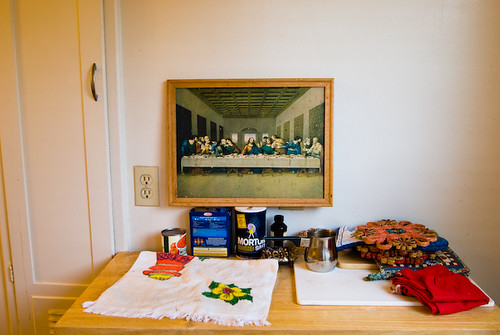
The Last Supper with More Than a Grain of Salt 2, originally uploaded by neocles.
This print of the last supper had always hung near the breakfast table in my parents’ home. It was no different here at my mother’s last apartment, although it had fallen off the wall and sat around for a few months. I set it back here the other day, and it seemed a fine place for photo. A detail shot would reveal drops of this and that, and a spattering of tomato sauce.
It is a bit of an odd assortment off things on the cupboard, most sitting for weeks without notice from mom. Tomato sauce, orzo, salt, vanilla flavoring, the Greek coffee pot (the briki), and assorted trivets. A couple times in recent months my mom had cooked food with some odd flavorings, like baked chicken with a heavy dose of cinnamon or ground cloves. Eventually she gave up on seasonings and then finally on cooking much of anything besides boiled eggs, green beans, or broccoli.
Today, we went to Kaiser for an eye check-up and to start the process of getting a new pair of glasses. She had misplaced her only pair. It turns out that her right eye needs just about the strongest lens available. The doctor could not determine a prescription for the left eye at all because she is nearly blind from a cataract. So, we’ll be going back for cataract removal, and then eventually for a prescription for the left eye. Shit, no wonder the apartment was a mess. And no wonder the chicken was seasoned with salt and clove instead of salt and pepper.
Suitcase 4
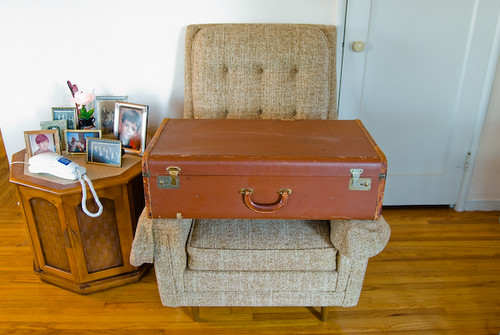
Suitcase 4, originally uploaded by neocles.
I’m slowly making my way through photographing the items in my mother’s apartment. I only vaguely remember the suitcase. It was not used very often. In fact, the only time I remember it being used was when my mom visited Greece once. When we moved my mother up here we just packed it full of curtains she had made for her house. She would not let me throw them away.
The chair and end table are part of a set purchased when we moved into a new house my dad had built on Griffith Way in Fresno, back in 1967. There are two chairs and couch which, unfortunately, were reupholstered around 1980. The sofa was cobalt blue and I’ll never forget that thing. But I can’t quite picture the original color of the chairs.
The furniture all has to be gotten rid of soon. I was all ready for that. But now I feel more sad about seeing it all go. I had a fantasy while I was going through stuff the other day that I could move my mom back into her house in Fresno and find a wonderful, reliable, relatively inexpensive 24/7 live-in caretaker for her. Then all the power objects could stay together for another couple years. But these childish dreams must be left behind…
Leaving Home For Good – Family Snapshot
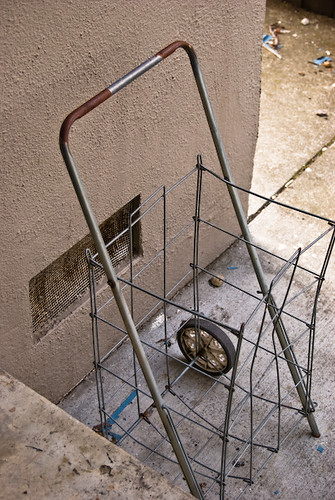
The Grocery Cart #2, originally uploaded by neocles.
My mother, Efrosini Serafimidis, will be 90 years old this month. For the last five years she has been living down the street from us in a little one bedroom apartment. We moved her up here to Albany from Fresno and the home in which she had lived for over 30 years. I was resistant to moving her at the time, but my cousins insisted it was necessary. It is not easy for a person in their 80’s to switch gears like that. She still complains bitterly everyday about this place, and I think she still is a little resentful towards me on that count. But she did okay for two or three years.
The last couple years have been increasingly challenging. She has had a hip replacement and big surgery on a broken elbow. Also, she has been pretty lonely during the days when we are at work, and the lack of interaction and stimulation has taken a toll on her.
The next move is now necessary. This month, Effie will be going to a board and care facility somewhere nearby. It is going to be hard to do, and the transition is going to be a struggle, I’m sure. But her hips are not holding her up very well, and she is suffering from some dementia. She has wandered off a couple times, but her incredible luck with coming across non-Greek-speaking people who are charmed by her old-country, head-scarved, four-foot-ten-inch figure has held up. Each time we got her back none the worse for the wear.
Of course, Sarah and I both work full time, and have a five-year-old to attend to. And living in the Bay Area has its own challenges. So, I would not say I have been an overly conscientious caregiver, but nonetheless, I see her and give her her meds almost every day, try to keep her reasonably safe and fed, bring her back and forth to my home, clean her apartment, pay her bills, take care of her legal and financial matters, manage the renting of the family home in Fresno, and so on.
Chief among the challenges of moving her to a care facility is going to be the dissolving of her apartment home and figuring out what to do with all the things in it. We got rid of a lot of stuff when we moved her to Albany. But a lot of stuff is still packed away in her apartment. I am very nostalgic about these things and have a tough time just trashing them even though they are otherwise pretty worthless.
In response to all this I am planning a photo series. Right now the idea is simple snapshot-like photos of, basically, every object in her apartment. Where possible, descriptions will accompany the photos. Eventually, the series will include photos of each and every object I still have from my parents. I may be an old man myself by the time I finish.
Russian Christmas Dinner
Russian Christmas Dinner
at Chez Serafimidis
Rocky Hill, Executive Chef
Our fun, Russian-themed menu for Christmas dinner this year.
First Courses
Chicken Pate, Neo
Dolmas, Neo
Smoked Salmon, Neo and Rocky
Pickled Herring, Rocky
Black Bread, Rocky
Soup Course
Christmas Borscht, recipe ideas, 1, 2, 3, 4, Ray and Marge
Main Course
Mushroom Pie, recipe idea, Ray and Marge
Red Beans with Herb Dressing, recipe idea, Carrie
Egg Noodle and Cottage Cheese Casserole, recipe idea, Kate
Goose stuffed with Apples, recipe ideas, 1, 2, Neo
Desserts
Apple Charlotte, Rocky
Sour Cream Cake, Rocky
Efrosini Holding Neocles
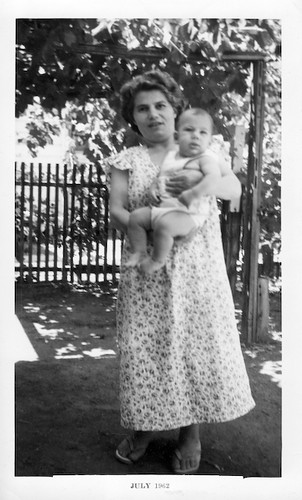
Efrosini Holding Neocles, originally uploaded by neocles.
My earliest memories go back to the house my parents lived in when I was born, at 818 “S” St. in Fresno CA. We were Greeks on the edge of Armenian Town. I don’t quite remember living there, since we moved when I was about two years old. But I almost do. I remember being at the house, although I think it was when my parents were going back and fixing it up to sell when I was about three and half years old.
I remember the look of the old wooden house, the wood floors, the old door knobs, the pulley clothes line that stretched from a window to the far reaches of the back yard. I remember the feel of the hot, powdery dirt in the Fresno summer, and the way it smelled when the water from the bib fell onto it, making dusty explosions that turned to mud. I vividly recall, even now, the smell of the cellar we retreated to for lunch once the sun was high and hot. We sat at a card table and ate in near darkness, the only light streaming in from the cellar door at the top of the stairs. There was a certain musty smell of damp concrete that I encounter every few years, and when I do I am transported back to that cellar more fully than any sci-fi invention could ever achieve.
I toddled around the front yard and wandered into the yard next door. There I encountered the old Armenian woman who lived there. She was very old and bent over, wrinkled and gray. In my memory, she was wandering around her garden tending to her plantings, she wore nothing above the waist and her breasts hung low and flat. She spoke to me in Armenian and I understood nothing of what she said to me. I stood and stared up at her, a little afraid, but not too much, perplexed by the sound of this language. She smiled as she spoke and chuckled around the edges. My mother called and I turned to go, running through the powdery dirt that burned my feet. The smell of Sycamores wafted by as I scrambled up the front steps.
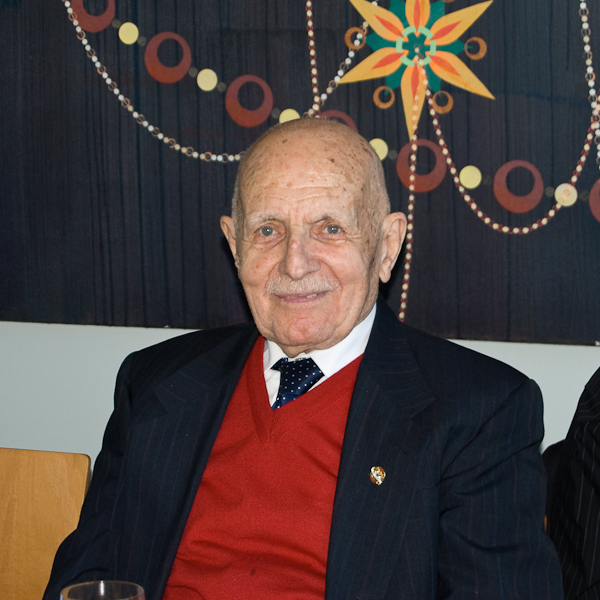


You must be logged in to post a comment.